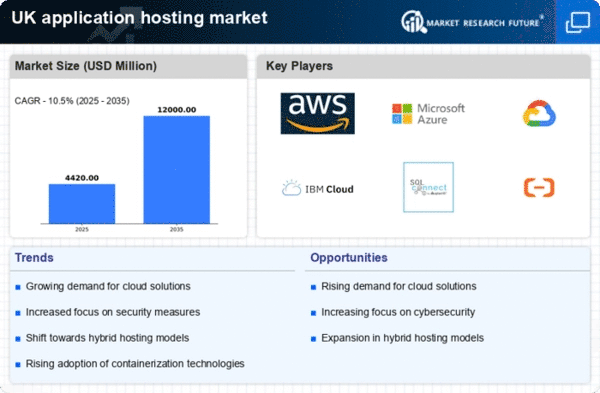Emergence of Edge Computing
The application hosting market in the UK is increasingly influenced by the emergence of edge computing, which decentralises data processing closer to the source of data generation. This shift is particularly relevant for industries such as manufacturing and IoT, where real-time data processing is crucial. By utilising edge computing, organisations can reduce latency and improve application performance, which is becoming a key competitive advantage. The application hosting market is likely to adapt to this trend by offering specialised hosting solutions that cater to the unique requirements of edge computing. As businesses seek to harness the power of real-time analytics, the demand for edge-enabled hosting services is expected to rise.
Rise of Hybrid Hosting Solutions
The application hosting market in the UK is witnessing a rise in hybrid hosting solutions, which combine the benefits of both on-premises and cloud environments. This trend appears to be driven by the need for flexibility and control over data management. Many organisations are adopting hybrid models to optimise their IT infrastructure, allowing them to maintain sensitive data on-premises while leveraging the scalability of cloud services for less critical applications. This dual approach is likely to enhance the resilience and performance of IT operations. As a result, the application hosting market is poised for growth, with providers developing innovative hybrid solutions to meet diverse customer needs.
Increased Focus on Cost Efficiency
Cost efficiency remains a critical driver for the application hosting market in the UK. As businesses strive to optimise their operational expenditures, many are turning to application hosting solutions that offer scalable pricing models. The shift from traditional on-premises infrastructure to cloud-based hosting can lead to substantial savings, with estimates suggesting that companies can reduce IT costs by up to 30% through effective cloud adoption. This financial incentive is particularly appealing to small and medium-sized enterprises (SMEs) that may lack the resources for extensive IT investments. Consequently, the application hosting market is likely to see a rise in demand as organisations seek to balance performance with cost-effectiveness.
Growing Adoption of Digital Transformation
The application hosting market in the UK is experiencing a notable surge due to the growing adoption of digital transformation initiatives across various sectors. Businesses are increasingly migrating their operations to cloud-based platforms to enhance efficiency and scalability. According to recent data, approximately 70% of UK enterprises have initiated digital transformation projects, which often necessitate robust application hosting solutions. This trend is likely to continue as organisations seek to leverage advanced technologies such as artificial intelligence and machine learning, which require reliable hosting environments. The application hosting market is thus positioned to benefit from this shift, as companies demand more flexible and responsive hosting services to support their evolving digital strategies.
Regulatory Compliance and Data Sovereignty
The application hosting market in the UK is significantly influenced by regulatory compliance and data sovereignty concerns. With stringent regulations such as the General Data Protection Regulation (GDPR) in place, businesses are compelled to ensure that their data hosting practices align with legal requirements. This has led to an increased demand for local hosting solutions that guarantee data remains within UK borders. As organisations navigate the complexities of compliance, the application hosting market is expected to expand, with providers offering tailored solutions that address these regulatory challenges. The emphasis on compliance not only enhances trust but also drives innovation in hosting services.
















